| More about: | Saddam Hussein, Paul Volcker, Richard Goldstone, United Nations |
UN oil-for-food probe nears end
Report due on Oct. 27 will focus on the companies that received contracts.


| More about: | Saddam Hussein, Paul Volcker, Richard Goldstone, United Nations |